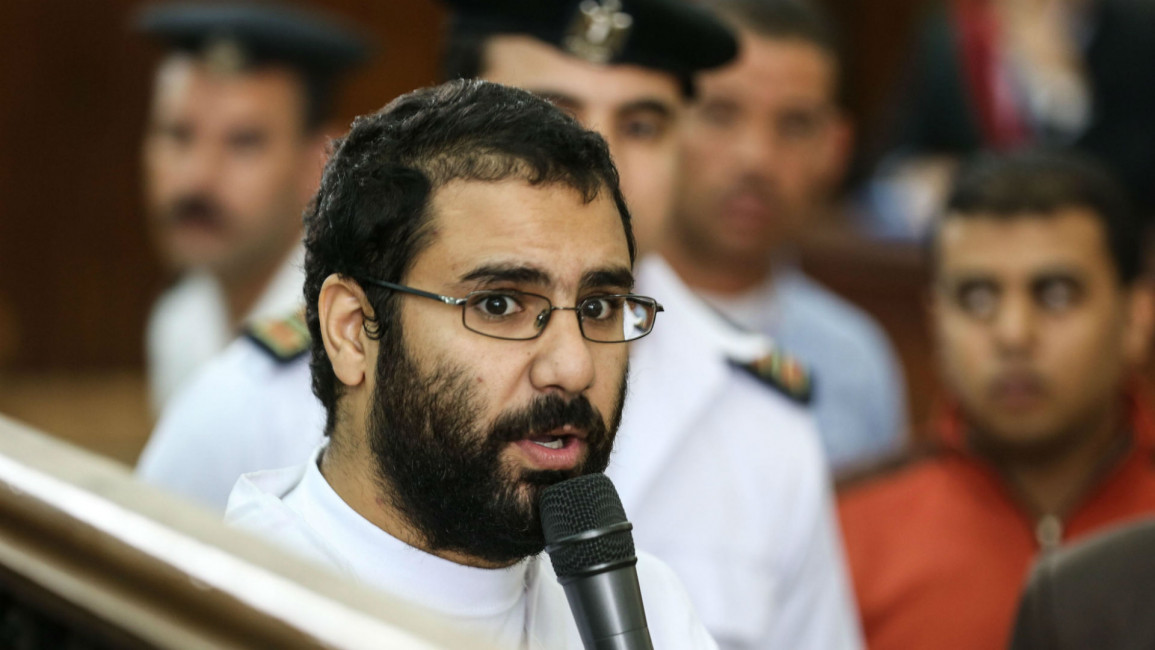Imprisoned Egyptian pro-democracy activist Alaa Abdel Fattah launches hunger strike
A statement from his family said the conditions of Abdel Fattah’s detention are "the worst of all his previous detentions dating back to 2006".
They said they were informed of the strike on 13th April.
Egypt's prisons have been sealed off from visitors, lawyers and almost all communications since 10 March, which authorities claim is a precaution against the spread of coronavirus.
However, activists inside and outside the country have highlighted the dire conditions inside Egypt's overcrowded and unsanitary detention facilities that could make them the epicentre of a Covid-19 crisis.
In-depth: Middle East regimes are freeing inmates as coronavirus spreads. But political prisoners remain behind bars
Many have called on Egypt to follow the example of other states in the region and release vulnerable and low-risk offenders, those in pre-trial detention as well as the thousands of political prisoners, in order to prevent such a crisis from happening.
Abdel Fattah has been in pre-trial detention in the maximum-security Tora prison since September 2019, after he was swept up in the wave of arrests that followed the rare outbreak of anti-government protests.
Twitter Post
|
Like many others detained following the demonstrations, Abdel Fattah has not been convicted, but stands charged of "belonging to an illegal organisation" and "spreading false news".
His family expressed their frustration at the fact that Abdel Fattah's pretrial detention is up for renewal every 45 days, however the hearings have been postponed "with no end in sight" during the Covid-19 lockdown.
He has not seen a lawyer, judge or family member in over seven weeks and has only been allowed to send one letter to his mother, fellow activist Leila Soueif.
"While Egypt enters its third week of curfew, family members on both sides of the prison walls are being kept in a state of panic," the family's statement said. "Egypt holds at least 60,000 political prisoners and the health record within the carceral system is appalling."
A 2016 report on prison conditions in Egypt said detainees did not have access to basic hygiene and likened the conditions to medieval times "when maltreatment, torture, deprivation of food and healthcare were typical characteristics of life in prison".
After his arrest, Abdel Fattah told his lawyers he had been blindfolded, insulted, slapped, kicked and threatened never to be released from the prison.
His aunt, the prominent author Ahdaf Soueif said in the statement: "Historically, Alaa used his profile, his body and his words to confront injustice - on his own account and on behalf of others. By going on hunger strike now he draws attention to the plight of tens of thousands in Egypt's prisons."
Abdel Fattah's sister Mona Seif said the family had spent months "fighting for his right to books, letters, newspapers, exercise and time out of his cell".
"These are basic rights. Now the regime is using coronavirus to cut them off further, to make their conditions even worse and our fight has been reduced to just trying to confirm Alaa is OK, while Alaa has to fight by starving himself - putting his body in even more danger in the midst of this crisis - to try and reclaim his and other prisoners' most basic rights," she added.
At the time of his arrest, 37-year-old Abdel Fattah was serving five years of probation after completing a five-year jail sentence in March 2019 for staging a protest against a 2013 law effectively banning public gatherings.
His probation required him to report to a police station near his home in Cairo at 6 PM every evening, and stay overnight in a cell until 6 AM.
Follow us on Facebook, Twitter and Instagram to stay connected.



